Introduction
The church and indeed Christianity, was born at Pentecost which is referred to in Acts chapter 2. This was 50 days after Passover when Jesus of Nazareth was crucified, declared dead, and interned in a tomb. Jesus rose, and for 40 days presented Himself to His disciples and many other people including 500 at one time (1 Corinthians 15:6). It was at this Pentecost that Peter preached to the crowd that Jesus is the Christ (Messiah), God has raised this Jesus to life, and we are all witnesses of the fact (verse32). On that day: Those who accepted his message were baptised and about three thousand were added to their number (verse 41), and the church began.
These Christians subscribed to a different set of values. They had the Old Testament which stated that everyone was created in the image of God making each person precious in God’s sight. And that we are all of one blood. The fact that Jesus took on the form of a man and His death and resurrection confirmed the dignity, value and worth of the human condition.
This Christian message from Jesus is to love one another as I have loved you was taken throughout the world.
 Throughout its long history, the Christian Church has been a major source of social services like schooling and medical care; inspiration for art, culture, and philosophy; and an influential player in politics and religion. It has, over many centuries, promulgated the teachings of Jesus within the Western world as well as throughout other nations. Festivals like Easter and Christmas are marked as public holidays; the Gregorian Calendar has been adopted internationally as the civil calendar; and the calendar itself is measured from the date of Jesus’s birth.
Throughout its long history, the Christian Church has been a major source of social services like schooling and medical care; inspiration for art, culture, and philosophy; and an influential player in politics and religion. It has, over many centuries, promulgated the teachings of Jesus within the Western world as well as throughout other nations. Festivals like Easter and Christmas are marked as public holidays; the Gregorian Calendar has been adopted internationally as the civil calendar; and the calendar itself is measured from the date of Jesus’s birth.
The value of human life
When Rome was the world power, human life had no value. People were executed for the most frivolous of reasons, gladiatorial sports satisfied the blood lust of the population, and abortions were carried out routinely. Christians believed that all people were created in the image of God and that gave life value.
Basil of Caesarea (330-379) helped stage public protests against the activities of the Guild of Abortionists who sold aborted human bodies to the manufacturers of beauty creams.[1]
The Christian Roman emperor Constantine (272-337) issued the Edict of Milan which gave Christianity legal status in the Roman Empire. He brought about moral reforms such as the emancipation of slaves, the abolition of crucifixion and the discouragement of infanticide.[2]
This same valuation of human life has continued up to the present. The United States of America is tearing itself apart over the right of a woman to abort her foetus for any reason. Christians have always upheld the sanctity of human life as shown, commencing at conception. Abortion violates this value.
Christianity provided a set of rules to live by
The Ten Commandments which God handed to Moses on Mount Sinia have formed the basis of moral teaching for both Jews and Christians and have become the foundation for the laws of many countries particularly in the West.
Alfred the Great (849-899) the first king to unite Britain and protect the people from the Danes. He saw himself in the tradition of God-appointed kings who would be held accountable to God at the Last Days for how they ruled. His laws were based on the Bible, and the biblical concept that people should be treated justly.
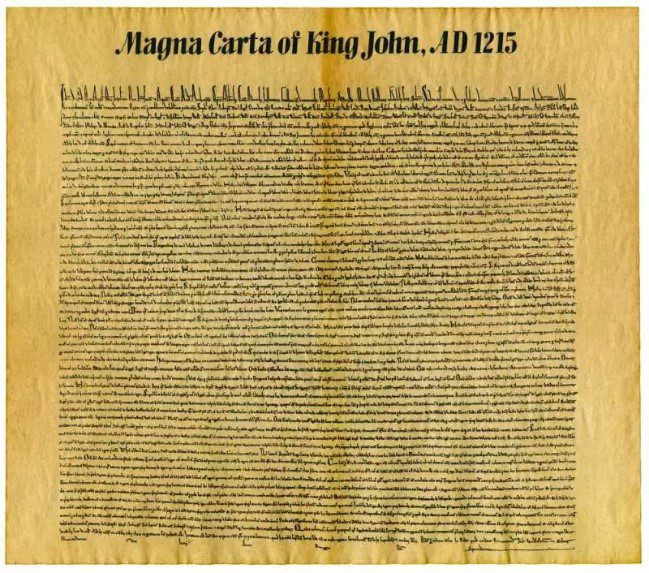 By signing the Magna Carta in 1215, the evil King John brought himself and England´s future rulers within the rule of law. The rule of law places a restraint on the exercise of arbitrary government power, and it places all people and civil government under law and that judges are expected to acquit the innocent and condemn the guilty. Justice must not be sold, denied, or delayed. The basis of a trial where witnesses are called is based on Deuteronomy 19:15 which requires two or more witnesses; one is not sufficient.
By signing the Magna Carta in 1215, the evil King John brought himself and England´s future rulers within the rule of law. The rule of law places a restraint on the exercise of arbitrary government power, and it places all people and civil government under law and that judges are expected to acquit the innocent and condemn the guilty. Justice must not be sold, denied, or delayed. The basis of a trial where witnesses are called is based on Deuteronomy 19:15 which requires two or more witnesses; one is not sufficient.
The Magna Carta was written by the Archbishop of Canterbury, Stephen Langton, the same man who placed chapters in the Bible. and it was based on biblical law.
It has been used to protect life, liberty, and property , and as the basis for constitutional rights around the world.
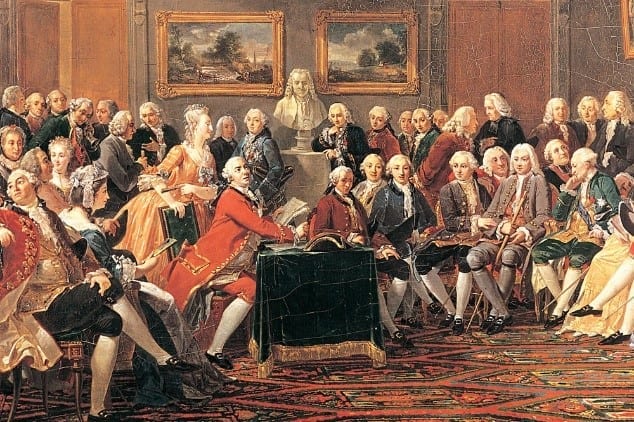 The guiding light for the fledging nation of America is in the Declaration of Independence (July 4, 1776) in it is the statement: We hold these truths to be self-evident, that all men are created equal and endowed by their creator with certain unalienable rights.
The guiding light for the fledging nation of America is in the Declaration of Independence (July 4, 1776) in it is the statement: We hold these truths to be self-evident, that all men are created equal and endowed by their creator with certain unalienable rights.
The Ten Commandments and the Sermon on the Mount contain my religion – John Adams (one of the five men who drafted the Declaration of Independence) wrote in a letter to Thomas Jefferson.
Harry S Truman, President of the United States, stated in a speech to the Attorney General’s Conference on February 15, 1950, The fundamental basis of this nation’s laws was given to Moses on the Mount. The fundamental basis of our Bill of Rights comes from the teachings we get from Exodus and St. Matthew, from Isaiah and St. Paul. I don’t think we emphasize that enough these days.
Christianity eliminated the slave trade
Christians knew that everyone was equal in God’s sight. The apostle Paul stated, In Christ we are all one, whether slave or free (Galatians 3:28). Yet the society into which Christianity was born, slavery was rampant. In the Roman empire, of the approximate population of 70 million people, it has been estimated that about 10 million were slaves.
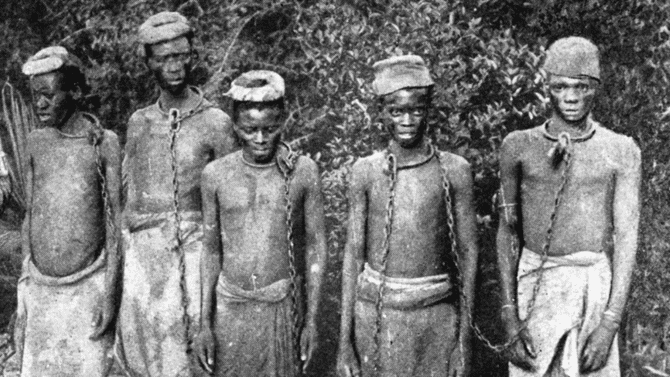 Christians have always opposed slavery. The following progress in opposition is taken from Sharon James’ book, How Christianity Transformed the World, 2021. In it, she cites the original references.
Christians have always opposed slavery. The following progress in opposition is taken from Sharon James’ book, How Christianity Transformed the World, 2021. In it, she cites the original references.
Lactanius (circa 250-325) stated in his work, Divine Institutes, that in God’s eyes, there were no slaves.
Father Gregory of Nyssa (335-395) attacked slavery for its sheer arrogance and violation of the free nature of human beings made in God’s image.
Clovis II King of the Franks (reigned 639-657) married his slave Bathilda in 649. She eventually mounted a campaign to halt the slave trade and redeem those in slavery.
The Christian Emperor Charlemagne (reigned 800-814) opposed slavery and by the eleventh century the last vestiges of slavery in central Europe were abolished.
When Queen Elizebeth I (reigned 1558-1603) was told of the early efforts to take slaves from Africa to the Americas, she was outraged and warned that the slave trade would call down the vengeance of heaven.
William Wilberforce (1759-1806) campaigned long and hard for the abolition of slavery in the British Empire. Encouraged by his friends John Wesley (1703-1791), the youngest British Prime Minister, William Pitt (1759-1806) and John Newton of Amazing Grace fame, and after many long years of struggle, he finally succeeded to get his bill for the abolition of slavery passed in the House of Commons in 1807. However, it was not until just before his death on January 6, 1833, that he received word that Parliament had passed the abolition act freeing 700,000 slaves.
In America, the book of Harriet Beecher Stowe (1811-1896), Uncle Tom’s Cabin, published in two volumes in 1852, had a profound effect on attitudes toward African Americans and slavery in the US. She believed that Christian love could overcome slavery. Abraham Lincon (1809-1865) credited her book with the success of his Emancipation Proclamation of 1863. Slavery completely ended after the success of the North over the South in the American Civil War (1861-1864.
Christian have opposed slavery because we are all of one blood, having the same parents in Adam and Eve. We are all made in the image of God and have equal value.
Christians established Organisations to help others
Orphanages
The Christian congregation has traditionally cared for the poor, the sick, widows, and orphans. The Bible gives Christians this responsibility as recorded in James 1:27; Religion that God our Father accepts as pure and faultless is this: to look after orphans and widows in their distress and to keep oneself from being polluted by the world.
The church had founded orphanages during the 4th century, and the monasteries took over this task during the Middle Ages. Also, they fought against the practice of abandoning unwanted children and they established hospitals.[3]
George Muller was convicted by his faith in God when began his work in 1834, as there were no orphanages in England, children had to fend for themselves on the rat infested streets. Between April 1836, and May 26, of 1897, Muller’s orphan houses had provided accommodation, clothes, and food for 9,844 children.
In the 19th century, Christian organizations built orphanages as a swift solution to the dire need of abandoned and neglected children. American Protestants funded orphanages around the world, and Christians became the primary provider of orphan care. American Christians give an estimated $3.3 billion to orphanages annually. Now, Christian organisations throughout the world provide for and support orphanages where the need is greatest, mainly in underdeveloped countries.
Hospitals.
 The establishment of hospitals is the outflow of biblical teaching to Love your neighbour as yourself (Leviticus 19:18, Matthew 7:12; 22:39).
The establishment of hospitals is the outflow of biblical teaching to Love your neighbour as yourself (Leviticus 19:18, Matthew 7:12; 22:39).
The word Hospital is derived from the Latin word hospes meaning to practise hospitality or neighbourly love.
The beginning of hospitals appears to have been by the Christian noblewoman Fabiola (died 399) who established a public funded hospital and cared herself for the sick and dying.[4]
As a means of caring for those who were ill, St. Basil of Caesarea founded a complex of hospitals, orphanages, and hostels for the poor (circa. 369).[5] Christian hospitals grew rapidly, spreading throughout both the East and the West. By the fourteenth century England alone with fewer than four million people had six hundred hospitals. By the mid-1500s there were 37,000 Benedictine monasteries alone throughout Europe that cared for the sick.
Thomas Sydenham (1624-1689) is remembered as the Father of English Medicine. He insisted on accurate observation and careful diagnosis. During the Great Plague of 1665, he remained in London to treat those who were suffering, defying personal risk. Sydenham was motivated by a deep Christian faith.[6]
So, the modern hospital owes its origins to Judeo-Christian compassion. Evidence of the vast expansion of faith-based hospitals is seen in the legacy of their names: St. Vincent’s, St. Luke’s, Mt. Sinai, Presbyterian, Mercy, and Beth Israel. These were all charitable hospitals, some of which began as foundling hospitals to care for abandoned children.[7]
 The Red Cross.
The Red Cross.
The International Red Cross started in 1863 and was inspired by Swiss businessman and committed Christian, Henry Dunant. The suffering of thousands of men on both sides of the Battle of Solferino in 1859 upset Dunant. Many were left to die due to lack of care. He proposed creating national relief societies, made up of volunteers, trained in peacetime to provide neutral and impartial help to relieve suffering in times of war. In response to these ideas, a committee, which later became the International Committee of the Red Cross, was established in Geneva. The founding charter of the Red Cross was drawn up in 1863.
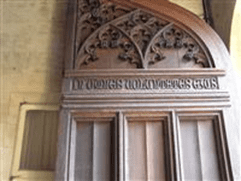 Universities commenced as an outgrowth of monasteries
Universities commenced as an outgrowth of monasteries
Over the main entrance of the Cavendish Laboratory, the home of the Department of Physics in the University of Cambridge, is an inscription from Psalm 111:2: The works of the Lord are great; sought out of all them that have pleasure therein. It was inscribed on the building’s great oak doors. The inscription replaced the original Latin version when the new laboratory was built in 1973. It does make the point that the laws of nature have been set by the Lord and we are encouraged to explore and investigate them.
Universities were largely creations of the church. Irrespective whether they were formed by bishops or by informal groups of teachers and scholars, they were soon under the control of the church, except in the eastern Mediterranean. They obeyed its precepts; they promoted its goals. They were spurred by and preceded by the schools attached to monasteries and cathedrals; the monks and friars were often the main scholars inside them.[8] A few examples follow:
 The University of Bologna (shown), Italy, was founded in 1088 and is the oldest university in Europe. It commenced by teaching church law and civil law.
The University of Bologna (shown), Italy, was founded in 1088 and is the oldest university in Europe. It commenced by teaching church law and civil law.
The University of Paris was established between 1160 and 1250. It commenced under the supervision of Notre Dame Cathedral for the study of theology.
Oxford University. There is no clear date of its foundation, but teaching existed at Oxford in some form in 1096 and developed rapidly from 1167. The roll of the university was to teach, argue and reason within a Christian framework.
University of Edinburgh had a thoroughly evangelical beginning, being founded under Presbyterian auspices.
Cambridge University was established in 1209 by Christian leaders.
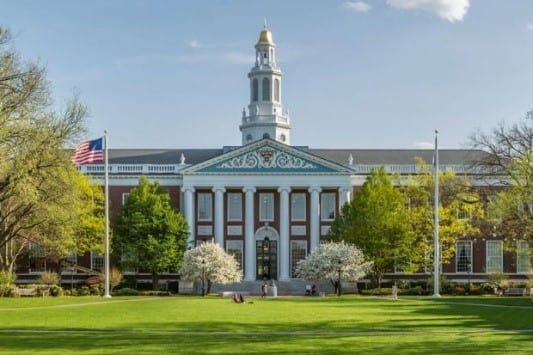 Harvard University (shown) is America’s oldest learning institution, founded in 1636. At its inception, its purpose was mainly to educate clergy. In 1639, the school’s name became Harvard University after the Rev. John Harvard.
Harvard University (shown) is America’s oldest learning institution, founded in 1636. At its inception, its purpose was mainly to educate clergy. In 1639, the school’s name became Harvard University after the Rev. John Harvard.
Princeton University. New Light Presbyterians founded the College of New Jersey, later Princeton University, in 1746 to train ministers dedicated to their views. The college was the educational and religious capital of Scottish-Irish America.
Science
The notion held by early scientists, is that God set and fixed the laws of nature, and they are capable of being understood. This thinking set the conditions under which modern science and mathematics could flourish. The early chemist Robert Boyle (1627-1692) said: Nature is nothing else but God acting according to certain laws He Himself fixed.
Physicist, Lord Kelvin (1824–1907), stated: Please rejoice in the design and the designer!
Below, is an incomplete list of Bible-believing, church-attending Christians, who as scientists, set the foundations on which modern science was built.
Nicholas Copernicus (1473-1543): the Polish astronomer who put forward the first mathematically based system of planets rotating around the sun.
Frances Bacon (1561-1626): Established the scientific method.
Galileo Galilei (1564-1642): The earth rotates around the sun.
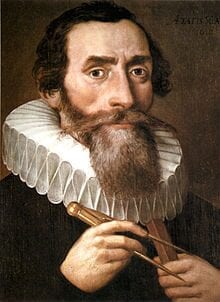 Johannes Kepler (1571-1630), shown: A key figure in the 17th-century scientific revolution. He is best known for his laws of planetary motion.
Johannes Kepler (1571-1630), shown: A key figure in the 17th-century scientific revolution. He is best known for his laws of planetary motion.
Rene Descartes (1596-1650): a French mathematician, scientist and philosopher who has been called the father of modern philosophy.
Blaise’ Pascal (1623-1662): a French mathematician, physicist, and religious philosopher, who laid the foundation for the modern theory of probabilities.
Robert Boyle (1627-1691): A 17th-century pioneer of modern chemistry.
Isaac Newton (1642-1726/7): an English mathematician, astronomer, theologian, author, and physicist who is widely recognised as one of the most influential scientists of all time.
Carl Linnaeus (1707-1778): A Swedish botanist, physician, and zoologist, who formalised the modern system of naming organisms.
John Dalton (1766-1844): He is best known for introducing the atomic theory into chemistry.
Michael Faraday (1791-1867): Laws governing electricity and magnetism.
Charles Babbage (1791-1871): Designed the first computers.
Gregor Mendel (1822-1884); Established the foundation of modern genetics.
Louis Pasteur (1822-1895): Renowned for his discoveries of the principles of vaccination. The process of ‘pasteurization’, was named is in honour.
Lord Kelvin (1824–1907), Physicist, of whom the absolute thermodynamic temperature scale is named.
Max Planck (1858-1947): best known for quantum theory, which revolutionized our understanding of the atomic and sub-atomic worlds.
Marriage
 The sacrament of marriage was initiated by God (Genesis 2:24); one man one woman united for life. It formed the basis of a family for the raising of children. It has served Western society extremely well with the family as the basic building block of society. Survey after survey has revealed that the family with a biological father and mother united in the bond of marriage provides the best environment for the raising of children.
The sacrament of marriage was initiated by God (Genesis 2:24); one man one woman united for life. It formed the basis of a family for the raising of children. It has served Western society extremely well with the family as the basic building block of society. Survey after survey has revealed that the family with a biological father and mother united in the bond of marriage provides the best environment for the raising of children.
The Arts
 The cultural influence of the church has been vast. The renaissance masterpieces produced by Catholic artists like Michelangelo, Leonardo da Vinci and Raphael at that time remain among the most celebrated works of art ever produced. Similarly, Christian sacred music by composers like Pachelbel, Vivaldi, Bach, Handel (shown), Mozart, Haydn, Beethoven, Mendelssohn, Liszt, and Verdi are among the most admired classical music in the Western canon.
The cultural influence of the church has been vast. The renaissance masterpieces produced by Catholic artists like Michelangelo, Leonardo da Vinci and Raphael at that time remain among the most celebrated works of art ever produced. Similarly, Christian sacred music by composers like Pachelbel, Vivaldi, Bach, Handel (shown), Mozart, Haydn, Beethoven, Mendelssohn, Liszt, and Verdi are among the most admired classical music in the Western canon.
Conclusion
In summarising his book, A Short History of Christianity, Geoffrey Blainey, a non-Christian, made the following comment:
Christianity probably has been the most important institution in the world in the last 2,000 years. It has achieved more for western civilisation than has any other factor; it has helped far more people than it has harmed. So much of what seems admirable in the world today comes largely or partly from Christianity and from people who practised it.
Footnote
Unfortunately, there is a sad footnote to this story. The very thing, Christianity, that made the West great, the West is now rejecting and consequently, we are witnessing its decline. The god-ordained institution of the family bonded in marriage between one man and one woman and the raising of children in this environment is being trashed. The result; increasingly high rates of single parent families, children being born out of wedlock, homosexual couples adopting children, homelessness, alcohol, and drug addiction. Suicide is now the greatest killer of men. In fact, suicide deaths now exceed deaths from motor car accidents in most Western countries.
[1] Sharon James, How Christianity Transformed the World, Christian Focus, 2021, page 73.[2] Diana Lynn Severance, Feminine Threads, Christian Focus, 2011. Cited by Sharon James, page 75.
[3] Encyclopedia Britannica online: https://www.britannica.com/topic/Christianity/Care-for-widows-and-orphans.
[4]Sharon James, How Christianity Transformed the World, Christian Focus, 2021, page 129.
[5] Gerald R. McDermott, The Oxford Handbook of Evangelical Theology, Oxford University Press, 2010, page 481.
[6] S James page 134.
[7] Charles E Rosenberg, The Care of Strangers, The Rise of America’s Hospital System, New York, Basic Books, 1987.
[8] Geoffrey Blainey, A Short History of Christianity, Viking an imprint of Penguin Books, 2011, page 180.


3 Comments. Leave new
Boring as ever – Not asking one question or mentioning Stephen Hawkin
I strongly disagree, Mike. The fact that someone has views opposing yours does not mean their comments are boring! I found this article extremely interesting and thought-provoking.
Praise God! The article is informative and helpful for us.